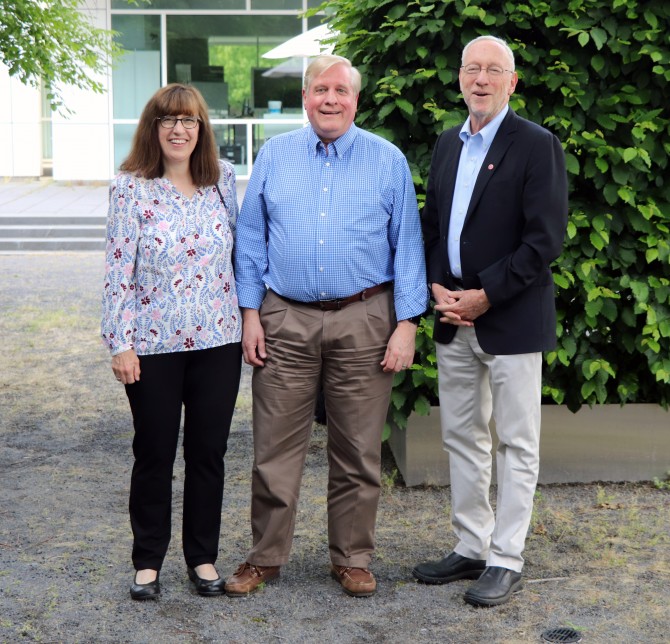Emr wins $1.2M Shaw Prize in Life Science and Medicine
By Kate Blackwood
Scott Emr, the Frank H.T. Rhodes Class of 1956 director of the Weill Institute for Cell and Molecular Biology and professor of molecular biology and genetics in the College of Arts and Sciences, was awarded the Shaw Prize in Life Science and Medicine for the landmark discovery of the Endosomal Sorting Complexes Required for Transport (ESCRT) Pathway – essential in diverse processes central to life, health and disease.
The ESCRT Pathway is a key aspect of membrane biology, including cell division, cell-surface receptor regulation, viral dissemination and nerve axon pruning. The ESCRT complexes have implications in many diseases, including cancer, Parkinson’s and viral infections.
“This award is a momentous and well-deserved honor for Professor Emr, whose discoveries about transport pathways have transformed cell biology. Professor Emr’s research is an inspiration to countless students and exemplifies the rigor and vision of research at Cornell,” said President Martha E. Pollack.
The Shaw Prize, which includes an award of $1.2 million, was announced June 1.
“The Shaw Prize is a tremendous recognition of Professor Emr’s pioneering work and, more broadly, it speaks volumes about the high caliber and fundamental significance of research undertaken by College of Arts and Sciences faculty,” said Ray Jayawardhana, the Harold Tanner Dean of the College of Arts and Sciences and professor of astronomy. “The seminal discoveries made in his laboratory shed light on life’s machinery and pave the way for understanding and tackling some of the most prevalent diseases.”
Emr said he woke up the morning of the announcement to find emails from colleagues in earlier time zones offering congratulations on the Shaw Prize. “It is a wonderful honor that recognizes the accomplishments of a long line of talented graduate students and postdocs who have worked with me during my career,” Emr said. “I feel very grateful.”
The discovery of the ESCRT complexes relates to Emr’s general research on cell signaling pathways.
The ESCRT Pathway is a landmark because the ESCRT complexes reveal a universal mechanism that cells use to bend membranes in a unique manner, Emr said. This mechanism is central to several important biological processes including cell division, remodeling of neurons, and processes that slow or stop cell growth.
“Defects in ESCRT function can lead to uncontrolled cell growth and tumor formation, contributing to many diseases, including cancer, neurodegeneration, and Parkinson’s disease,” Emr said.
Understanding of the pathway also has implications for control and treatment of viruses. ESCRT is key in viral budding, the process through which viral progeny are released after reproducing in an infected host cell, Emr said. Many viruses, such as HIV, use the ESCRT machinery to bud out of the surface of an infected host cell.
“Inhibition of the ESCRTs can block the release and transmission of viruses,” Emr said.
The Emr lab published the first ESCRT protein complex, ESCRT-I, in 2001, after working on the problem since 1995. In a series of papers since then, the lab has described all five of the ESCRT protein complexes and their role in the recognition and delivery of membrane proteins to the lysosome where they are inactivated.
“We are still working on this problem today,” Emr said. The lab just had a new paper about the ESCRT-III complex accepted for publication in the journal eLife.
The Shaw Prize, administered by the Shaw Prize Foundation in Hong Kong, is an international award “to honor individuals who are currently active in their respective fields and who have recently achieved distinguished and significant advances, who have made outstanding contributions in academic and scientific research or applications, or who in other domains have achieved excellence.”
Established in 2002 under the auspices of Hong Kong television and film executive and philanthropist Run Run Shaw (1907-2014), the Shaw Prize confers three annual awards in astronomy; life science and medicine; and mathematical sciences.
Kate Blackwood is a writer for the College of Arts and Sciences.
Media Contact
Get Cornell news delivered right to your inbox.
Subscribe


